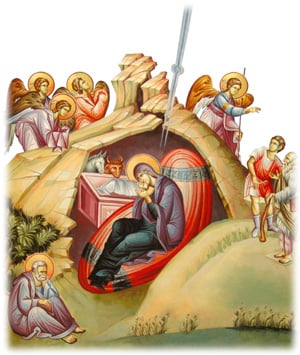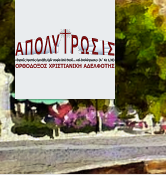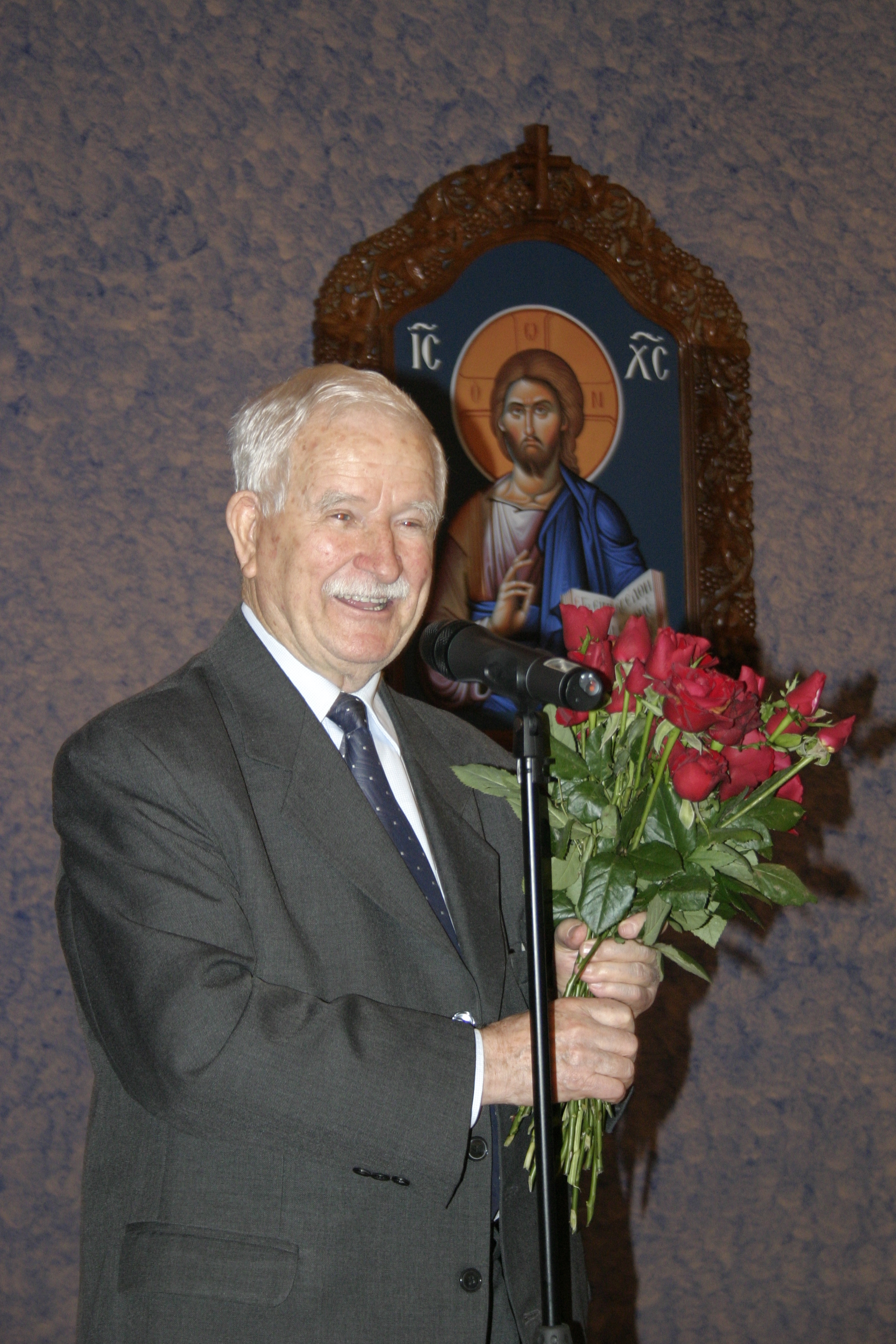Translation from the book:
Στεργίου Ν. Σάκκου, Ἑρμηνεία στό κατά Λουκᾶν Εὐαγγέλιο, τόμ. Α΄,
ἐκδ. «ΧΡΙΣΤΙΑΝΙΚΗ ΕΛΠΙΣ» ΟΡΘΟΔΟΞΗ ΑΔΕΛΦΟΤΗΤΑ, Θεσ/νίκη 2008, σσ.100-106
(Stergios N. Sakkos [Read CV], A Commentary on the Gospel according to St. Luke, vol. A', pp. 100-106)
2,8. Καὶ ποιμένες ἦσαν ἐν τῇ χώρᾳ τῇ αὐτῇ ἀγραυλοῦντες καὶ φυλάσσοντες φυλακὰς τῆς νυκτὸς ἐπὶ τὴν ποίμνην αὐτῶν.
2:8 And there were shepherds abiding out in the field in that region, keeping watch over their flock by night.
The “country” here is the countryside of Bethlehem. In this area little David used to raise his sheep, to commune with God and sing his songs with the psaltery (harp), praising the divine greatness as he experienced and studied it in nature and in the history of his people. There he was inspired for the sweet and prophetic Psalm 22.
The verb “ἀγραυλοῦντες” means “keeping out in the fields” i.e., to spend the night in the open air. At that time the night was divided into four shifts (6-9 p.m., 9-12 p.m., 12-3 a.m., 3-6 a.m.), which were called "watches". The shepherds stayed awake to protect their flock from thieves and carnivorous animals. We conclude that Christ was born at night from the fact that the angel appeared to the shepherds during their night shift.
It has been suggested that Christ was not born on December 25, because it would have been impossible for the shepherds to keep night shifts during the winter. In Judea, however, even in winter the cold was not unbearable.
The Church was not interested in the exact date of Christ's birth, nor did the apostles take the trouble to find out and record the exact date, because this did not concern the historical reliability of the event. What is certain is that on December 25, the pagans celebrated the sun god with many glorious events. The Church in the West, wishing to stop these celebrations, established the celebration of Christmas. In the 4th century, on the initiative of St. Chrysostom, this custom was transferred to the East. Until then, Christians had celebrated Epiphany, that is, Christ’s coming into the world: his birth, circumcision and baptism all together on the 6th of January.
2,9. Καὶ ἰδοὺ ἄγγελος Κυρίου ἐπέστη αὐτοῖς καὶ δόξα Κυρίου περιέλαμψεν αὐτούς, καὶ ἐφοβήθησαν φόβον μέγαν.
2:9 And suddenly an angel of the Lord appeared in front of them, and the glory of the Lord shone around them, and they were filled with great fear.
 In the midst of poverty and humiliation that surrounded Christ’s birth, divine glory and splendor appeared. God was humbled and born as a man, but heaven with supernatural signs testified to his divinity; by angels to the pious Jewish shepherds (cf. Lk 2:13) and by the star to the Wise Men of the East, representatives of the Gentiles (cf. Mt 2:2). “Secretly you were born in a cave, but heaven proclaimed you to all”, chants the ecclesiastical poet.
In the midst of poverty and humiliation that surrounded Christ’s birth, divine glory and splendor appeared. God was humbled and born as a man, but heaven with supernatural signs testified to his divinity; by angels to the pious Jewish shepherds (cf. Lk 2:13) and by the star to the Wise Men of the East, representatives of the Gentiles (cf. Mt 2:2). “Secretly you were born in a cave, but heaven proclaimed you to all”, chants the ecclesiastical poet.
The sudden appearance of an angel, probably Gabriel (cf. Lk 1:19. 26), is vividly indicated by the evangelist Luke with the introductory “suddenly” and the verb “appeared”. The extraordinary radiance made the supernatural event all the more imposing. This “glory of the Lord”, which shone around them, surrounded them without creating any shadow whatsoever, so as to make it clear that it was a divine light. The shepherds before these amazing signs, as was natural, were in great fear (cf. Lk 1:12. 29).
2,10-12. Καὶ εἶπεν αὐτοῖς ὁ ἄγγελος· μὴ φοβεῖσθε· ἰδοὺ γὰρ εὐαγγελίζομαι ὑμῖν χαρὰν μεγάλην, ἥτις ἔσται παντὶ τῷ λαῷ, ὅτι ἐτέχθη ὑμῖν σήμερον σωτήρ, ὅς ἐστι Χριστὸς Κύριος, ἐν πόλει Δαυΐδ. Καὶ τοῦτο ὑμῖν τὸ σημεῖον· εὑρήσετε βρέφος ἐσπαργανωμένον, κείμενον ἐν φάτνῃ.
2:10-12 And the angel said to them, "Be not afraid; for behold, I bring you good news of a great joy which will come to all the people; for to you is born this day a Savior, who is Christ the Lord, in the city of David. And this will be a sign for you: you will find a baby wrapped in swaddling clothes and lying in a manger."
The angel first reassured the shepherds (cf. Lk 1:13. 30), so that they might understand better the joyful message he would announce to them. This message would give great joy “to all the people”, to all the people of Israel who were waiting for the Redeemer, but also to the whole world who were longing for a Saviour. The event which the angel announced, the cause of the great joy, was the Saviour’s birth long awaited by Israel and expected by the Gentiles; “for to you is born this day a Savior”. The time had come for Isaiah's prophecy to be fulfilled; "for unto us a child is born, unto us a son is given” (9:6). The pronoun “you” certainly does not refer only to the shepherds, but includes all the Jewish people and all mankind.
Of particular interest is the phrase “Christ the Lord”. The prophets, kings and chief priests were called “anointed by the Lord”. Their anointing meant that they were chosen and blessed by God. Jesus was different from all the others anointed by the Lord. He is the preeminent Christ, the expected Messiah (cf. Jn 1:42), but at the same time the Lord Himself, Yahweh. The other anointed ones were anointed by the Holy Spirit; Jesus possessed all the Holy Spirit as his own, since "in him dwelleth all the fulness of the Godhead bodily” (Col 2:9). He would also announce this by applying Isaiah’s prophecy (61:1-2) to himself (see Lk 4:18-19).
The depth of the divine condescension is truly fathomless! God did not send prophets or angels to save us (see Heb 2:16), because they could not bear the enormous burden of our sins and pay the price of our debt. For our salvation he sent his own only begotten Son to be born as a man like us!
The expression “in the city of David”, which means Bethlehem, reminded the shepherds of Micah’s prophecy (5:1).
The angel gave the shepherds a sign, a mark, which would help them to meet and recognize the Savior; “you will find a baby wrapped in swaddling clothes and lying in a manger”. They would find an infant wrapped in swaddling clothes in a manger. The shepherds’ faith was put to the test as the angel’s word clashed with all their expectations of the Messiah. Of course, they would not expect to find him as a poor and weak infant born in a stable.
2,13. Καὶ ἐξαίφνης ἐγένετο σὺν τῷ ἀγγέλῳ πλῆθος στρατιᾶς οὐρανίου αἰνούντων τὸν Θεὸν καὶ λεγόντων.
2:13 And suddenly there with the angel a multitude of a heavenly army was praising God and saying.
God’s angels are called “a multitude of a heavenly army” (see 1 Kings 22:19). The word "army" indirectly indicates the sovereignty of the newborn infant. It differs, of course, from the other armies that bring war; this one proclaims peace. At the creation of the world, "when the stars were born" (Job 38:7), the angels burst out in praise; how could they remain silent before the miracle of re-creation that took place that night in Bethlehem?
2,14. δόξα ἐν ὑψίστοις Θεῷ καὶ ἐπὶ γῆς εἰρήνη, ἐν ἀνθρώποις εὐδοκία.
2:14 Glory to God in the highest, and on earth peace, good will toward men.
Briefly and powerfully, the angelic hymn announced that Christ’s birth revealed the glory of the Most High God, brought peace on earth and his good will to mankind.
“Glory to God in the highest”: The Most high God was revealed to the world with Christ’s birth. The natural creation and the history of the chosen people of Israel had, of course, given evidence of his power, wisdom and greatness (cf. Rom 1:20). But never before had his glory been so displayed as in the cave of Bethlehem, for never before had his love been so expressed. This revelation was in itself God’s glory. As the glory of a diamond is its brilliance, as a king’s glory is his office when it is exercised rightly, so God’s glory is his own appearance.
“And on earth peace”: By the word "peace" the prophets express all the sublime Messianic good things (see Is 26:12). Lord’s coming to earth signified the return of peace, which was lost when man broke that first covenant with God in paradise. As the Creator revisited his mankind to renew their first agreement, peace returned to earth, not in an abstract sense as a condition, but specifically as a person; "For he is our peace, who has made us both one, and has broken down the dividing wall of hostility" (Eph 2:14; cf. Is 9:6). Christ became man's essential link with his fellow man, as he united believers as members in his body, in the community of peace, the Church.
“Good will toward men”: Jesus’ birth revealed the triune God’s "good will", that is, his favor, the amnesty which he bestowed on the apostate man. This is appropriated only by the ones who accept the Lord Jesus Christ as a personal savior.
The angelic hymn is corresponding to the first three requests of the Sunday prayer (see Mt 6:9-10; Lk 11:2). The glory to the Most High God is the sanctification of his name. Peace dwells on earth when God’s kingdom is established in men’s hearts. Finally, God’s favor is felt when men implement his will. Indeed, through the application of the divine will, having as a prototype God’s beloved Son (cf. Mt 3:17; 17:5; Mk 1:11; Lk 3:22), we become men of divine’s favor, in whom God rests and dwells; only then peace is spread over the earth and Lord’s name is glorified as he makes us, his creatures, partakers of his glory and holiness.
2,15-16. Καὶ ἐγένετο ὡς ἀπῆλθον ἀπ᾿ αὐτῶν εἰς τὸν οὐρανὸν οἱ ἄγγελοι, καὶ οἱ ἄνθρωποι οἱ ποιμένες εἶπον πρὸς ἀλλήλους· διέλθωμεν δὴ ἕως Βηθλεὲμ καὶ ἴδωμεν τὸ ῥῆμα τοῦτο τὸ γεγονός, ὃ ὁ Κύριος ἐγνώρισεν ἡμῖν. Καὶ ἦλθον σπεύσαντες, καὶ ἀνεῦρον τήν τε Μαριὰμ καὶ τὸν Ἰωσὴφ καὶ τὸ βρέφος κείμενον ἐν τῇ φάτνῃ.
2:15-16 When the angels went away from them into heaven, the shepherds said to one another, "Let us go over to Bethlehem and see this thing that has happened, which the Lord has made known to us." And they came with haste, and found Mary and Joseph, and the baby lying in a manger.
The great event of Jesus’ birth involves the earth and heaven. The angels of heaven announced the joyful event and praised God. The people of the earth, with complete confidence in the angelic message, decided to go to Bethlehem to see “this thing that has happened”. They believed that what the angel had told them was already a fact. For the meaning of the word "ῥῆμα" in the Bible, see comments on 1:65.
The joy which the angel’s words caused to the shepherds was manifested in the diligence with which they carried out his command. They hastened to seek the infant, “they came with haste” and succeeded in finding it “lying in the manger”, as the angel had told them (see v. 12).
2,17-18. Ἰδόντες δὲ διεγνώρισαν περὶ τοῦ ῥήματος τοῦ λαληθέντος αὐτοῖς περὶ τοῦ παιδίου τούτου· καὶ πάντες οἱ ἀκούσαντες ἐθαύμασαν περὶ τῶν λαληθέντων ὑπὸ τῶν ποιμένων πρὸς αὐτούς.
2:17-18 And when they saw it they made known the saying which had been told them concerning this child; and all who heard it wondered at what the shepherds told them.
The shepherds “made known”, they told in detail what the angel had said to them. Seeing the divine child, they wanted to proclaim to all the joy of salvation (see vv. 10-11).
The narrative about the angels’ appearance moved the admiration of those who heard it; “all who heard it wondered”. But it was not known beyond the boundaries of Bethlehem. The people of Jerusalem were informed of Jesus’ birth by the Wise Men much later and were disturbed (see Mt 2:3).
2,19. Ἡ δὲ Μαριὰμ πάντα συνετήρει τὰ ῥήματα ταῦτα συμβάλλουσα ἐν τῇ καρδίᾳ αὐτῆς.
2:19 But Mary kept all these things, pondering them in her heart.
The virgin Mary treasured up in her heart what the shepherds told her and “pondering them” (cf. Lk 2:51), she kept them all in secret, “συμβάλλουσα”, comparing the events they told her with the revelations she had received up to that time. When the time came, the virgin told the evangelist Luke in detail and with simplicity all that she had “kept”. That is why he gives the fullest description of the events of the birth in his Gospel. Even the calm style and the soft tone of the narration support the assumption that he had heard it from the holy mother’s mouth. The evangelist faithfully recorded God’s Mother plain narrative without any additions.
2,20. Καὶ ὑπέστρεψαν οἱ ποιμένες δοξάζοντες καὶ αἰνοῦντες τὸν Θεὸν ἐπὶ πᾶσιν οἷς ἤκουσαν καὶ εἶδον καθὼς ἐλαλήθη πρὸς αὐτούς.
2:20 And the shepherds returned, glorifying and praising God for all they had heard and seen, as it had been told them.
The shepherds returned again to their daily life. But they did not fail to praise God for what they had heard from the angels and seen fulfilled in the manger where they worshipped the divine child.
Copyright © 2021 by Orthodox Christian Association «ΧΡΙΣΤΙΑΝΙΚΗ ΕΛΠΙΣ» ΟΡΘΟΔΟΞΗ ΑΔΕΛΦΟΤΗΤΑ. Used by permission. All rights reserved.










